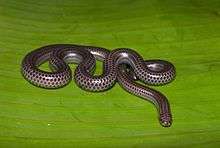Big-scaled blind snake
The big-scaled blind snake (Trilepida macrolepis) is a species of snake in the family Leptotyphlopidae.[2][3] The species is endemic to southern Central America and northern South America.
| Big-scaled blind snake | |
|---|---|
 | |
| Scientific classification | |
| Kingdom: | Animalia |
| Phylum: | Chordata |
| Class: | Reptilia |
| Order: | Squamata |
| Suborder: | Serpentes |
| Family: | Leptotyphlopidae |
| Genus: | Trilepida |
| Species: | T. macrolepis |
| Binomial name | |
| Trilepida macrolepis (W. Peters, 1857) | |
| Synonyms[1] | |
| |
Taxonomy
T. macrolepis is the type species of the genus Trilepida.[1]
Geographic range
T. macrolepis has been reported from Brazil, Colombia, Ecuador, the Guianas, Panama, and Venezuela.[1]
Description
T. macrolepis has 14 rows of scales around the body. Each scale has a lighter border. The centers of the scales in the seven dorsal rows are uniform dark brown to black. The centers of the scales in the seven ventral rows are light brown to brown.[1]
Reproduction
T. macrolepis is oviparous.[1]
gollark: He didn't break any rules.
gollark: SERIOUSLY?
gollark: You COULD have done it.
gollark: > why would I look for the leaker if I was himTo cover your tracks.
gollark: You have not got sufficient evidence to not blame Gibson.
References
- Trilepida macrolepis at the Reptile Database.
- McDiarmid RW, Campbell JA, Touré T (1999). Snake Species of the World: A Taxonomic and Geographic Reference, Volume 1. Washington, District of Columbia: Herpetologists' League. 511 pp. ISBN 1-893777-00-6 (series). ISBN 1-893777-01-4 (volume).
- "Leptotyphlops ". Integrated Taxonomic Information System. Retrieved 29 August 2007.
Further reading
- Adalsteinsson SA, Branch WR, Trape S, Vitt LJ, Hedges SB (2009). "Molecular phylogeny, classification, and biogeography of snakes of the family Leptotyphlopidae (Reptilia, Squamata)". Zootaxa 2244: 1-50. (Tricheilostoma macrolepis, new combination).
- Boulenger GA (1893). Catalogue of the Snakes in the British Museum (Natural History). Volume I., Containing the Families ... Glauconiidæ ... London: Trustees of the British Museum (Natural History). (Taylor and Francis, printers). xiii + 448 pp. + Plates I-XXVIII. (Glauconia macrolepis, new combination, p. 69).
- Freiberg M (1982). Snakes of South America. Hong Kong: T.F.H. Publications.189 pp. ISBN 0-87666-912-7. (Leptotyphlops macrolepis, p. 118).
- Hedges SB (2011). "The type species of the threadsnake genus Tricheilostoma Jan revisited (Squamata, Leptotyphlopidae)". Zootaxa 3027: 63–64. (Trilepida macrolepis, new combination, p. 63).
- Peters W (1857). "Vier neue amerikanische Schlangen aus der Familie der Typhlopinen und darüber einige vorläufige Mittheilungen ". Monatsberichte der Königlichen Preussischen Akademie der Wissenschaften zu Berlin 1857: 402–403. (Stenostoma macrolepis, new species, p. 402). (in German and Latin).
- Ruthven AG (1922). "The Amphibians and Reptiles of the Sierra Nevada de Santa Marta, Colombia". University of Michigan Museum of Zoology, Miscellaneous Publications (8): 1-70. (Leptotyphlops macrolepis, new combination, p. 64).
This article is issued from Wikipedia. The text is licensed under Creative Commons - Attribution - Sharealike. Additional terms may apply for the media files.